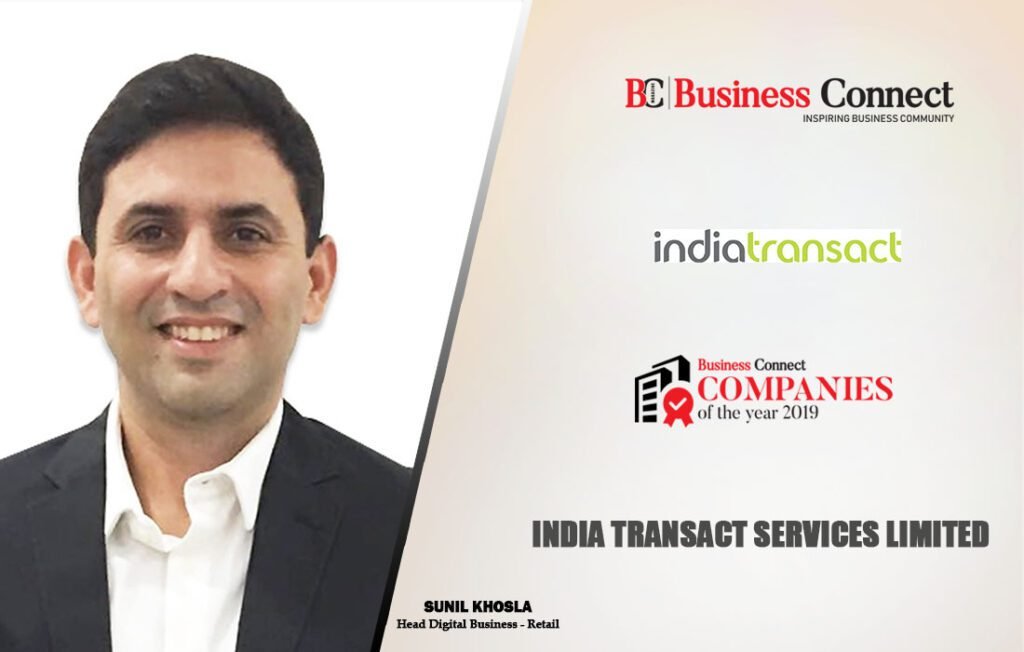INDIATRANSACT: Transactions made Simple
INDIA TRANSACT SERVICES LIMITED
From being a cash-centric economy, India’s digital payment story is impressive and exciting. Over time, there has been a huge shift in the payments landscape of India and digital payment is a dynamic industry to be a part of at this time. The digital payments segment witnessed a dramatic rise with the growth of e-commerce companies followed by the emergence of digital wallet companies and technology start-ups in India. The growing popularity of alternative payment solutions and digital commerce, in general, further adds fillip to the electronification trend in India. It is vital to keep pace with the progressions and offer solutions and services with the latest technologies in such a disruptive market scenario.
About three years ago, India witnessed a major frenzy and felt like it was left at a midpoint due to demonetization. Though the citizens had to endure a lack of cash flow initially, the digital payments ecosystem obtained this new opportunity that opened up and has witnessed huge growth, ever since. As per various analysts, over the next few years, the Digital payment ecosystem will witness a whole new way of how money circles in the economy.
Despite all the growth, awareness and increase in adoption rate, the digital infrastructure still needs a thrust to further widen its reach and penetrate within the Indian financial ecosystem as well as rural geographies. As per the RBI report of August 2019, for a total of 878 million credit and debit cards in the country, there are only 4.4 million PoS devices and only 2,07,144 ATMs. This shows there is a huge gap in the existing demand and supply that needs to be addressed. Currently, digital payment systems are highly dependent on smartphones with a data connection, NFC, Bluetooth, etc. There is still a huge amount of population in India that does not use smartphones. The percentage of smartphones that are NFC enabled or have access to QR Code mechanisms is also very low. Therefore, there is a dire need for a low-cost, more interoperable and universal infrastructure of digital payments. This provides room for innovative start-ups to bring in disruptive technologies entailing low-cost adoption models. Solutions which can resolve this technology-utility gap to make digital payments accessible are unprecedented. Entrepreneurs can leverage this gap to enter this market.
India Transact Services Limited is a prominent Omni-channel merchant digital payment solutions company that provides a host of products and services to merchants with an aim to simplify the process of transacting and merchant acquisition, in addition to providing other value-added services. The team at India Transact consists of highly passionate individuals who consistently strive towards providing the customers with innovative and best-in-class payment solutions through their products and services. Headquartered in Mumbai, India Transact is a wholly-owned subsidiary of AGS Transact Technologies Ltd., India’s leading end-to-end payment solutions provider with core operations in Banking Automation Services, Banking Payment Solutions and other Automation Solutions.
Through their brand ‘Ongo’, India Transact is focused towards creating an alternate payments ecosystem. As of October 2019, India Transact has approximately 1.5 lacs digital payment acceptance points contributing a peak monthly Gross Transaction Value of 1300 crores and has expanded to 1800 cities across India.
Their best-in-class Ongo POS machines extend support to the Digital India initiative enabling merchants all over India to accept electronic payments with enhanced security features.
Their product and services range from POS (point-of-sale) terminals equipped with the latest technology to facilitate fast and secure payments in the store and on-the-go. Their device-based portfolio comprises of POS terminals including Android PoS, GPRS & Digi- PoS as well as Integrated POS solutions. In addition to terminals, India Transact also caters to device-less Solutions such as Payment Gateway, enabling Bharat QR transactions, BHIM/UPI payments and value-added services comprising of Loyalty Cards – Rewards & Prepaid, Billing Software, Cash@POS among others.
The organization believes in providing the best services and includes a list of clientele including several leading names from Banking, Retail & Hospitality, Petroleum, Education and Transit sectors amongst others. Their solutions and product portfolio caters to micro, small and medium enterprises, and merchants as well.
Constant technological advancements and innovations are the order of the day. Everything is going mobile and customers keep up with the recent changes. Therefore, to ensure that opportunities are not missed, it is very important to stay abreast with the developments and offer the latest technologies in the market. India Transact believes in constant innovation and keeps exploring new possibilities to enhance the customer experience.
India Transact’s offerings encourage the adoption of digital payments amongst SMEs and MSMEs. Digital revolution is possible only through Financial Inclusion and their products in true sense empowers the merchants belonging to these low strata to promote the usage of digital modes of payment acceptance and make India a Digitally strong nation.
Over the past three years, we have witnessed a number of initiatives taken by the Government to steer the Indian economy towards digitalization. To incline consumers towards digital payments various efforts have been initiated towards providing better internet connectivity, technologically advanced equipment and security against hackers. There has also been a rise in digital credit into bank accounts due to the government’s direct-benefit transfers, and digitalization of government payments. Although to go truly digital, retailers should make a conscious shift and strategized initiatives must be implemented by the industry bodies. Clearly there is a lot that needs to be initiated to achieve the end goal of realizing the ‘Digital India’ dream. However, the onus does not lie solely with the government and enterprises. The government and individuals have to come together to bring about the necessary change.



